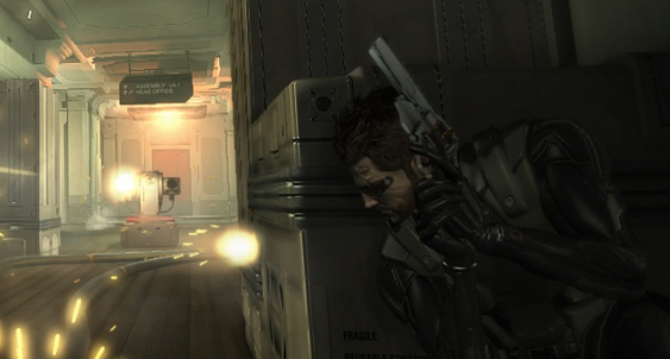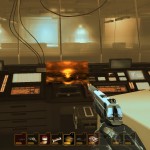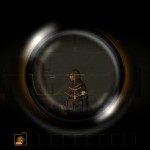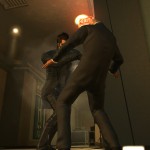Ah, Human Revolution. I do want to like you. Really. You’re flashy and smooth in all the right places. But let’s be honest -- you’re not melee-friendly. For a game that totes non-linear gameplay as a staple, I find you oddly disconcerting. I still like you at arms length, yet that’s clearly not where I want to be. But I forgive you because you’re beautiful, so let’s go on with what you do do well.
Deus Ex: Human Revolution is by Eidos Montreal, the developers behind the recent Tomb Raider, and launched in 2011 for consoles and PC. This first-person shooter is the third in the series, which focuses on stealthy gameplay in a cyberpunk world where cyborgs are the future of mankind. Human Revolution is a prequel to the series (Deus Ex, followed by sequel Invisible War, and then prequel Human Revolution). The first game is a classic masterpiece; the second one was a disaster, how will Human Revolution hold up?
The storyline is deep and immersive, with twists that spice up the universe. It explores the humanity of making ourselves part machine. Augments are rejected by the human body, so cyborgs must take a drug called Neuropozyne to survive. The drug is very expensive and there is a division between economic classes, forcing the super poor into dismal slums. You play as Adam Jensen, a security guard for an “augmentation,” or cyborg implant, company called Sarif Industries. Adam is forced to undergo augmentations while unconscious, and struggles with his humanity the entire game. Adam is cool and sassy; he is a character that you want to get to know.
It’s not long into the game when you encounter your first problem: a long, unskippable cutscene. This is fine on the first playthrough, but the game encourages players to play on different difficulty levels, experience the different endings and decisions, and utilize different playstyles. After the cutscene and a tutorial level, you are taken to the hub city, where you complete minor quests to level up and get gear. Levels grant you the ability to upgrade or buy new augments, which help solve puzzles or kill enemies. Augments can also be purchased with credits, which can be found on enemies or by completing missions. You can also add attachments to your weapons, which range from extra ammo to homing bullets. Every so often, after completing some key smaller missions, you will receive a bigger mission which will take you out of the hub city. These bigger missions have many paths to the same objective, and usually include a boss. You can choose different ways to pass the same obstacle, and there are air vents and secret passages along the way.
If you choose a combat approach to completing objectives, you have three general playstyles to work with: stealthily, guns-a-blazing, or non-lethal. You can choose whether to use a lethal or non-lethal melee attack. Melee attacks cost energy, which can be upgraded through augments or refilled with candy bars. If all energy cells are depleted, your last one will charge. This means that you can never automatically charge your other energy cells. This also means that there is a waiting game between melee attacks. Since you get extra points for taking down somebody with a melee attack, maximizing your experience gain requires waiting. There is almost no incentive for taking down somebody lethally. It is not any easier either. You get extra points for all non-lethal kills, but most guns are lethal, making non-lethal gunplay a challenge. Another problem is the bosses. They have great character, but they are extremely easy to beat if you simply use an augment called Typhoon. If you choose not to, they are very fun, have a good difficulty level, and often have some kind of special weakness. You can interact with the environment; you can pick up explosive barrels to throw at enemies, shoot a fire extinguisher on the wall while an enemy is walking by to cut off his oxygen supply, or you can move a dumpster and some boxes to make yourself makeshift stairs.
The soundtrack is great; it’s as if the original Deus Ex soundtrack and the Mass Effect soundtrack morphed into one. The visuals exude a top-notch cyberpunk atmosphere. The hub cities look reminiscent of Blade Runner; the colors are dark and do a great job of representing a dystopian future. The architecture is grand but not gaudy. Characters come fully voice acted and you might recognize Jensen’s “I didn’t ask for this” meme. There are tons of hidden areas for exploration enthusiasts, and either contain loot or a view of the breathtaking scenery. And most importantly, there is nothing stopping you from saving your game and proceeding to wipe out every citizen in the town and the entire police force.
The melee system is problematic if you’re a fan of that type of gameplay. There is nothing that breaks immersion like waiting behind a trash can until your battery fills up just so you can punch a guy. The bosses are also a letdown. The experience system seems to promote a certain type of gameplay, and more freedom should be given to the player.
The game does offer a great experience and a large amount of playtime. Deus Ex has very good replayability by just experimenting with different playstyles, and the areas are well-designed so you can always find something new in the cities. The Missing Link DLC nicely fills in a missing section in the story with a
Human Revolution is a worthy successor to the franchise, and veterans of the original Deus Ex will not be disappointed. Anybody who enjoys the stealth genre will especially enjoy the game’s shadowy elements.
Ah, Human Revolution, come in for a hug. You deserve it.





